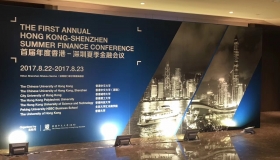Two Nobel Laureate Labs Established in CUHK (SZ)
On April 10, Arieh Warshel Institute of Computational Biology, headed by Nobel laureate in Chemistry in 2013 Arieh Warshel, and Kobilka Institute of Innovative Drug Discovery, headed by Nobel laureate in Chemistry in 2012 Brian K. Kobilka, were established at The Chinese University of Hong Kong, Shenzhen. These are the first batch of Nobel laureate research labs at the University.
Attending the plaque unveiling ceremony were Zhang Hu, Vice Mayor of Shenzhen Municipality, Liang Yongsheng, Director of the Science and Technology Innovation Committee of Shenzhen Municipality, Professor Yangsheng Xu, President of CUHK (SZ), Gao Ziming, Party Secretary of Longgang District, Dai Bing, Chief Executive of Longgang District, and Xu Jianling, Vice Chief of Shenzhen Education Bureau

Arieh Warshel Institute of Computational Biology

Kobilka Institute of Innovative Drug Discovery
Research Boosts Talent Cultivation
President Xu said that the establishment of these two institutes is a significant milestone in the University’s attempt to evolve into a world research university. The University has boasted of several high profile labs and institutes, including The Robotics and Intelligent Manufacturing Lab, Shenzhen Big Data Institute, and Shenzhen Finance Institute.
President Xu thinks highly of a research mode that matches research institutes with higher learning institutions. He believes that research is time consuming and may take decades or even longer time to finish a cycle. A university abounds in professors, scholars and financial support, providing perfect conditions for researchers to conduct and carry forward their research.
These labs are not a show-off. They are part of the University’s long-term development strategy. The University introduces these world-renowned scholars to China, and their students or assistants will have a chance to dedicate themselves to research in the University. However, research would be a waste of time if it was not offered to students as education resources. These Nobel Prize winners will work as distinguished professors, engaging in research and sharing their research results with students. Research and talent cultivation should form a mutual beneficial relationship.

Why Shenzhen?
“Last year when I came to Shenzhen I used a moving stairway, and I thought, Wow, these go much faster here than anywhere else I have ever been. That spirit of velocity and purpose stayed with me throughout my time here.” Professor Warshel explained why he has chosen Shenzhen to set up his institute. Shenzhen is one of the most vivid cities he and his wife have visited and he looks forward to working with his energetic colleagues at the University.
Arieh Warshel Institute of Computational Biology is intended to become one of the world’s most advanced computational biology centers, conducting research on cutting-edge biotechnologies (structural biology, molecular medicine, multi-scale biomolecule simulations, high-throughput Genome Sequencing analysis and translational research of gene diagnosis technology). Professor Warshel wishes to turn this institute into a platform where top researchers from around the world can collaborate and contribute. Meanwhile, the institute is to serve as a hub to boost significant global cooperative projects and to become a multidisciplinary educational center, nurturing young computational biologists.
Professor Kobilka told the audience that his institute features a unique system of hiring and advancement that encourages risk-taking and innovation. CUHK (SZ) is a new university and has a flexible system of recruitment, which will benefit the institute. Professor Kobilka will engage in directing and staffing the institute. His wish is that young and talented scientists could work on receptor structural biology, physiology and pharmacology in collaboration with top pharmaceutical companies to commercialize innovative drugs.
Executive Chief of Longgang District Dai Bing spoke about life science and its impact on the district’s 13th five-year plan. These two institutes will help to attract excellent researchers and open up new opportunities for Longgang and Shenzhen with respect to life science industry.

Arieh Warshel
Professor Arieh Warshel Profile
Prof. Arieh WARSHEL earned his PhD degree in Chemical Physics in 1969, respectively), with Shneior Lifson, Weizmann Institute of Science, Israel. He is a member of the United States National Academy of Sciences, honorary fellow of the Royal Society of Chemistry, Distinguished professor of Chemistry and Biochemistry at University of Southern California. He has become a distinguished professor by The Chinese University of Hong Kong, Shenzhen since September 2014.

Brian K. Kobilka
Professor Bian K. Kobilka Profile
Professor Brian K. Kobilka earned his M.D., cum laude, from Yale University School of Medicine. He was named a member of the National Academy of Sciences in 2011. He received the Nobel Prize in Chemistry with Robert Lefkowitz for discovering the inner workings of G protein-coupled receptors in 2012. His work has significantly influenced pharmaceutical research and manufacturing. He is a professor at Stanford University Department of Molecular and Cellular Physiology. He has become a distinguished professor of The Chinese University of Hong Kong, Shenzhen since February 2017.




